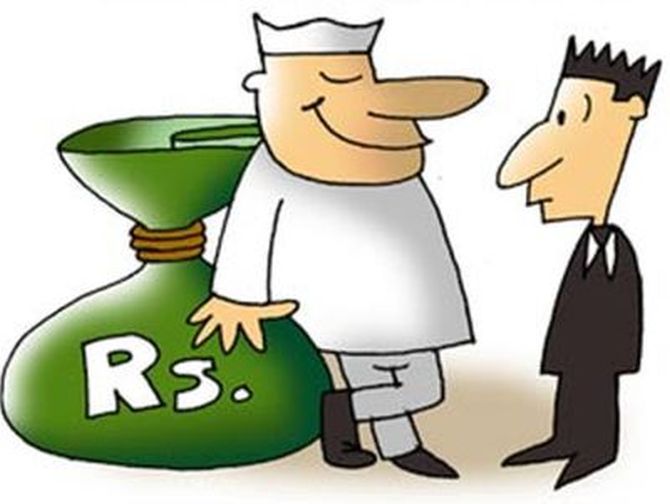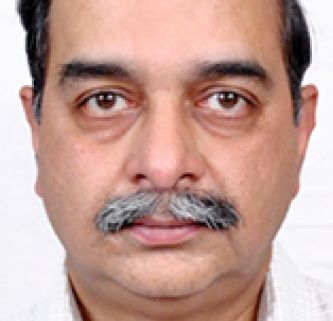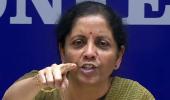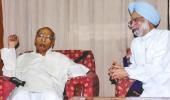'The corporate tax cuts will obviously result in lower tax payments by companies.'
Central Board of Direct Taxes Member Akhilesh Ranjan, bottom, convener of the task force on the new direct tax code, took early retirement from government service.
"These 37 years have been fulfilling and exciting. I have lots of things to look back on fondly," Ranjan tells Shrimi Choudhary and Dilasha Seth.

Your voluntary retirement was surprising, especially because you came first in the line of succession for the post of CBDT chairman.
I have spent 37 years in the service (Indian Revenue Service) and it was about five months to go if you go by the normal date of superannuation.
So it is not such an early retirement.
The only issue was whether I should have stayed on during these five months.
There were matters, including personal, that persuaded me to move out now.
You have been instrumental in several policy-making exercises, including the most-talked-about one, the direct tax code. What sort of challenges did you face while framing the new legislation?
Putting together the task force report was engrossing work.
The present task force was set up in November 2017, and we had about 80 meetings with various stakeholders.
There were issues outstanding when I took over as convenor in November last year.
A number of things were unresolved.
The constitution of the task force itself was interesting because we had people from various fields.
It was a challenge to understand the viewpoint of each person and bring that within the context of the direct tax reforms proposal that was acceptable to all.
Towards the last stages, Chief Economic Adviser Krishnamurthy Subramanian and the joint secretary (revenue) joined us.
The CEA held different views, and I am happy we were able to discuss all the issues.
We explained the tax perspectives to him because many a time economic concepts do not fully tie in with tax matters.
But we could arrive at a consensus on all aspects, and various views, not just of the policymakers but others also, were distilled (into the report).
It was practical, pragmatic work.
So, marrying the tax matters with economic concepts led to the dates for the report submission getting extended?
Of course. It is a challenge when somebody joins an ongoing project and there are disparate views on many matters.
But on the whole, we benefitted from the CEA's participation.
In the final reports, there were many concepts that are his contribution and many ideas we were able to modify, bringing into account the perspectives of an economist and a management expert.
Though it did become more difficult as time went on, it helped the result.
Do you think the government will approve all the proposals in the report?
I would love to see the entire report implemented because it is a package and it is difficult to pick some points and leave others.
These are recommendations looking at the country's needs, immediate requirements, concerns, and the plans of the government.
 There may be portions adapted and ideas in the report can be translated into positive measures.
There may be portions adapted and ideas in the report can be translated into positive measures.
That is our objective. We have also submitted a new draft of a new law and that is the second part of the report.
That is simpler and can be taken as a format.
Do you think the recent announcements on corporate tax cuts could hit the revenue collection target?
Anything that happens in the economy affects tax collection.
The recent corporate tax cuts will obviously result in lower tax payments by companies.
One cannot tell the (tax department) to collect the original amount of revenue estimated, regardless of the reduction in rates.
The idea is to collect the right amount of tax which is justified.
India has raised apprehensions at global fora, particularly at the Organisation for Economic Co-operation and Development about profit sharing by multinationals operating in the digital space. Could you elaborate?
India always had a consistent stand on this subject.
I will take you to the BPES (base erosion profit shifting) project, where the digital economy was felt to be the most important area that needed to be addressed.
Since 2013, we have been saying that this is an area that's to be looked at seriously.
Though the OECD did not give its final recommendations, it gave options and we did implement one, which is equalisation levy.
Now, the solution would be to address the core issue -- that the country will entitled to tax an enterprise even if it has no tangible and physical presence in the country.
The notion that income can be taxed if a firm has a physical presence has to go.
The recent OECD paper tries to incorporate three different proposals. It does recognise the fact that there has to be a nexus which is not dependent on the physical presence.
To that extent it is fine, but it did not talk about profit allocation, which is sticking to the arm's length principle (traditional principle) and departing from that very little.
Our view has been that perhaps this arm's length principle is suitable but should be modified to a large extent.
Not just India, many countries have reservations on these points.
Every developing nation from which multinationals derive revenue should be able to tax part of those.
Those ideas have been very much accepted.
But internationally, the opinion is that India's proposal of allocating profits by way of fractional apportionment through a formula -- taking into account factors like employees, assets, sales, and users -- is a complex one. What is your take on this?
We realise that taking into account assets and employees will complicate the concept, but we are willing to work on that.
However, the premise is that a company can do the same work anywhere else.
Therefore, we need to do away with the concept of physical presence in allocating routing profits, whatever be the formula.
Once the principal methodology is accepted, we can work on the finer details.
Why is the tax department yet to conclude matters on various global leaks?
The leaks were never complete, comprehensive, and concrete.
For example, if a company is floating a concern in a jurisdiction, there is nothing wrong with that.
(But) if things become suspicious, we investigate.
So, identifying those cases means deep investigation and that stage comes after a lot of examination of the facts.
We managed to make deep probes into such cases like Panama, Paradise and HSBC.
We have made tremendous progress in Switzerland, especially in the HSBC matter.
The problem there essentially is that it came from the bank and it was bound up with domestic regulations.
They say they cannot give any assistance because the information was stolen from the bank.
After much discussion and cooperation from the Swiss side, we have received detailed information under the tax treaty.
Probe agencies often say they face difficulties in obtaining information overseas.
We do get responses from almost all countries with a bit of follow-up if our request is made in a proper manner, keeping some standards in mind.
Similarly, we have been receiving a lot of requests and we managed to respond to a majority of them.
The new format of automatic exchange has been signed by 65 countries.
It takes away the hindrance of not sharing information.
It is set and codified and we have been getting information, particularly in the past three years.
The issue is utilising the information.
Will India expand the scope of the equalisation levy to other services, as is widely expected?
The levy is an interim measure we introduced in the absence of a global solution to the issue of taxing the digital economy.
We are waiting for a consensus.
We will wait till the end of 2020 and not take unilateral measures, and work, along with other countries, on a solution.
Any unfinished work?
These 37 years have been fulfilling and exciting.
I have lots of things to look back on fondly.
I did constructive work, particularly on tax policies and international taxation.
Yet there are unresolved issues.
India is making its point, so would love to carry them on for some more time and bring closure to them.
Similarly, in domestic taxation there are many things that can be done in direct tax reform and improving compliance.











